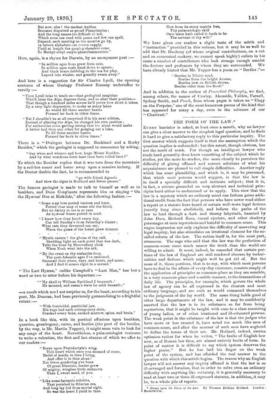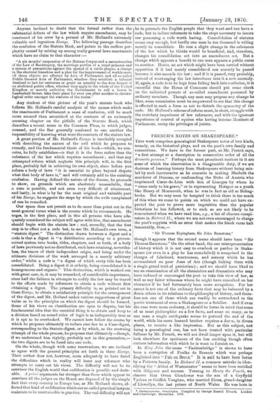THE FORM OF THE LAW.*
EVERY barrister is asked, at least once a month, why no lawyer can give a clear answer to the simplest legal question, and he finds it hard to give a satisfactory reply to this particular inquiry. The first answer which suggests itself is that the assumption which the question implies is unfounded ; but this retort, though obvious, has not the merit of truth. For though an intelligent lawyer who reads hard generally does know something of the subject which be studies, yet the more he studies, the more clearly he perceives the difficulty of giving offhand and correct solutions of what his acquaintance are pleased to call simple difficulties. Another reply which has some plausibility, and which is, it may be presumed, that which most persons would suggest, is that the law is in itself a specially difficult and intricate subject ; that it is, in fact, a science grounded on very abstract and technical prin- ciples hard either to understand or to apply. This view that the law is a mystery which no ordinary mind can fathom gains addi- tional credit from the fact that persons who have never read either a report or a statute have heard of certain well-worn legal fictions (mostly long since abolished), and believe the paths of the law to lead through a dark and thorny labyrinth, haunted by John Does, Richard Roes, casual ejectors, and other shadowy personages at once mysterious and hateful to common-sense. This vague impression not only explains the difficulty of answering any legal inquiry, but also stimulates an irrational clamour for the so- called reform of the law. The notion itself is, for the most part, erroneous. The sage who said that the law was the perfection of common-sense came much nearer the truth than the world are willing to admit. It must, indeed, be conceded that certain por- tions of the law of England are still rendered obscure by techni- calities and fictions which might well be got rid of. But the mass of it, those portions, that is to say, with which most persons have to deal in the affairs of every-day existence, consists simply of the application of principles as common-place as they are sensible, in a very common-place and sensible manner, to the transactions of daily life. The principles, for example, which govern the whole law of agency can be all expressed in the clearest and most ordinary language, and are such as would commend themselves to the judgment of the lay world. The same thing holds good of other large departments of the law, and it may be confidently asserted that the law is in its substance so far from being mysterious, that it might be taught with ease to a class consisting of young ladies, or of other irrational and ill-educated persons. The weak point in the substance of the law is that the judges who have more or less created it, have acted too much like men of common-sense, and after the manner of such men have neglectd to define the terms of their art. Mr. Holland, indeed, carries optimism rather far when he writes, "The faults of English law now, as of Roman law then, are almost entirely faults of form. In point of matter it is difficult to say which system deserves the higher praise." But he has laid his finger on the weak point of the system, and has afforded the real answer to the question with which this article begins. The reason why an English lawyer will not answer any inquiry offhand is that the law is so ill-arranged and formless, that in order to solve even an ordinary difficulty with anything like certainty, it is generally necessary to read at least two or three ill-expressed statutes, in addition, it may be, to a whole pile of reports.
• Essays upon the Form of the Law. By Thomas Erskine Holland. London : Butterworth.
Anyone inclined to doubt that the formal rather than the
sabstantial defects of the law which require amendment, may be convinced of his error by a perusal of Mr. Holland's extremely valuable and ingenious Essays. The following passage describes the confusion of the Statute Book, and points to the endless per- plexity caused by mixing up among really general laws enactments
which have no claim to that character :-
"A six months' suspension of the Habeas Corpus and a reconstruction of the Law of Bankruptcy, the marriage portion of a royal princess and a system of precautions against the spread of a cattle plague, a change in the electoral franchise and a plan for the improvement of workhouses, all these objects are effected by Acts of Parliament, and all so-called Public General Acts of Parliament, whether they establish a tribunal destined to last for centuries or grant an annuity to the door-keeper of an abolished public office, whether they apply to the whole of the United Kingdom or merely authorize the Government to sell a house in Leadenhall Street, take their place for over one after another in chrono- logical order amongst the statutes of the realm."
Any student of this picture of the year's statute book who
follows Mr. Holland's careful analysis of the causes which make the enactments of Parliament a mass of confusion, will be much more amused than astonished at the contents of an extremely amusing chapter on the pitfalls of the Statute Book, which describes a recent scene in the Common Pleas, in which judges, counsel, and the Bar generally confessed to one another the impossibility of knowing what were the contents of the statute law.
A great portion of Mr. Holland's Essays is inevitably occupied with describing the nature of the evil which be proposes to remedy, and the fundamental thesis of his book—which, we con- ceive, he fully establishes—is that it is the form rather than the substance of the law which requires amendment ; and that any attempted reform which neglects this principle will, in the first place, probably fail in achieving its own object, since before you reform a body of laws "it is essential to place beyond dispute what that body of laws is," and will certainly add to the existing confusion. Having defined the nature of the disease, he proceeds to show, on grounds which are absolutely unassailable, that a cure is possible, and not even very difficult of attainment, and lastly, in what is by far the most original and valuable part of his Essays, he suggests the steps by which the evils complained of can be remedied.
Our space does not permit us to do more than point out in the most general terms what is the course which he recommends. He urges, in the first place, and in this all persons who have ade- quately considered the subject will agree with him, that amendment should begin with the statute law ; and, secondly, that the first step is to effect not a code but, to use Mr. Holland's own term, a "statute digest." The distinction drawn between a digest and a code is that a digest is "a distribution according to a precon- ceived system into books, titles, chapters, and so forth, of a body of laws previously not so distributed, such laws retaining, neverthe- less, the traces of their independent origin, and being under the ultimate divisions of the work arranged in a merely arbitrary order," whilst a code is "a digest of which every title has been consolidated. Being a digest it is orderly, being consolidated it is homogeneous and organic." This distinction, which is worked out with great care, is, it may be remarked, of considerable importance,
since half the failures in attempts to codify the law may be traced to the efforts made by reformers to obtain a code without first obtaining a digest. The primary difficulty is, as pointed out in these Essays, to obtain a satisfactory principle for the arrangement of the digest, and Mr. Holland makes various suggestions of great value as to the principles on which the digest should be formed. Some of his views on classification are open to dispute, but his fundamental idea that the essential thing is to obtain and keep to a division based on sound rules of logic is as indisputably true as
it is apt to be overlooked. We cannot here follow the course by which he proposes ultimately to reduce case law to a Case-digest, corresponding to the Statute-digest, or by which, as the crowning triumph of the whole process, he proposes that ultimately—though, if we understand him rightly, probably not in this generation,— the two digests are to be fused into one code.
On the whole, though with some reservations, we are inclined
to agree with the general principles set forth in these Essays. Their author does not, however, seem adequately to have faced the difficulties which in reality will beset any reformer who attempts to carry out his views. The difficulty will not be to convince the English world that codification is possible and desir- able. A priori arguments far stronger than those which appear to convince all the judges on the Bench are disposed of by the simple fact that every country in Europe has, as Mr. Holland shows, ef- fected that kind of codification which our so-called practical lawyers maintain to be unattainable in practice. The real difficulty will not au*d Cambridge: ises be to persuade the English people that they want and can have a code, but to induce reformers to take the steps necessary to insure our possessing a code worth having. Consolidation of statutes seems easy enough, but hardly one man in ten thousand is willing merely to consolidate. He sees a slight change in the substance of the law which he thinks would be beneficial, said, therefore, changes his consolidation act into an amendment act. But a change which appears a benefit to one man appears a public curse to another. Hence, an act which might have been carried without opposition if it had merely consolidated can scarcely be passed because it also amends the law ; and if it is passed, very probably, instead of rearranging the law introduces into it a new anomaly. If, again, a code is to be kept from falling back into confusion, it is essential that the House of Commons should put some check on the unlimited powers of so-called amendment possessed by ordinary members. Though any man may propose any change he likes, some commission must be empowered to see that this change is effected in such a form as not to disturb the symmetry of the code. Mr. Holland's scheme of reform must, in short, struggle with the crotchety impatience of law reformers, and with the ignorant impatience of control of squires who having become Members of Parliament, usurp the privileges of jurists.



































 Previous page
Previous page